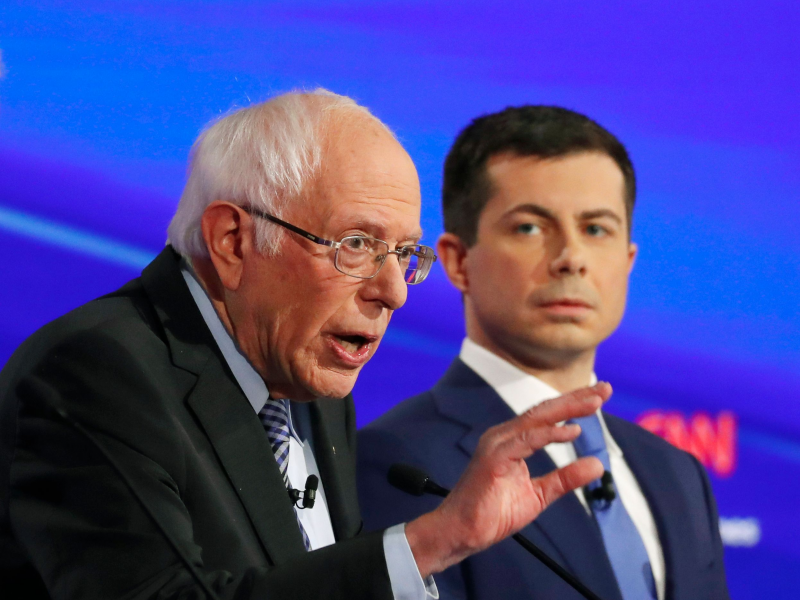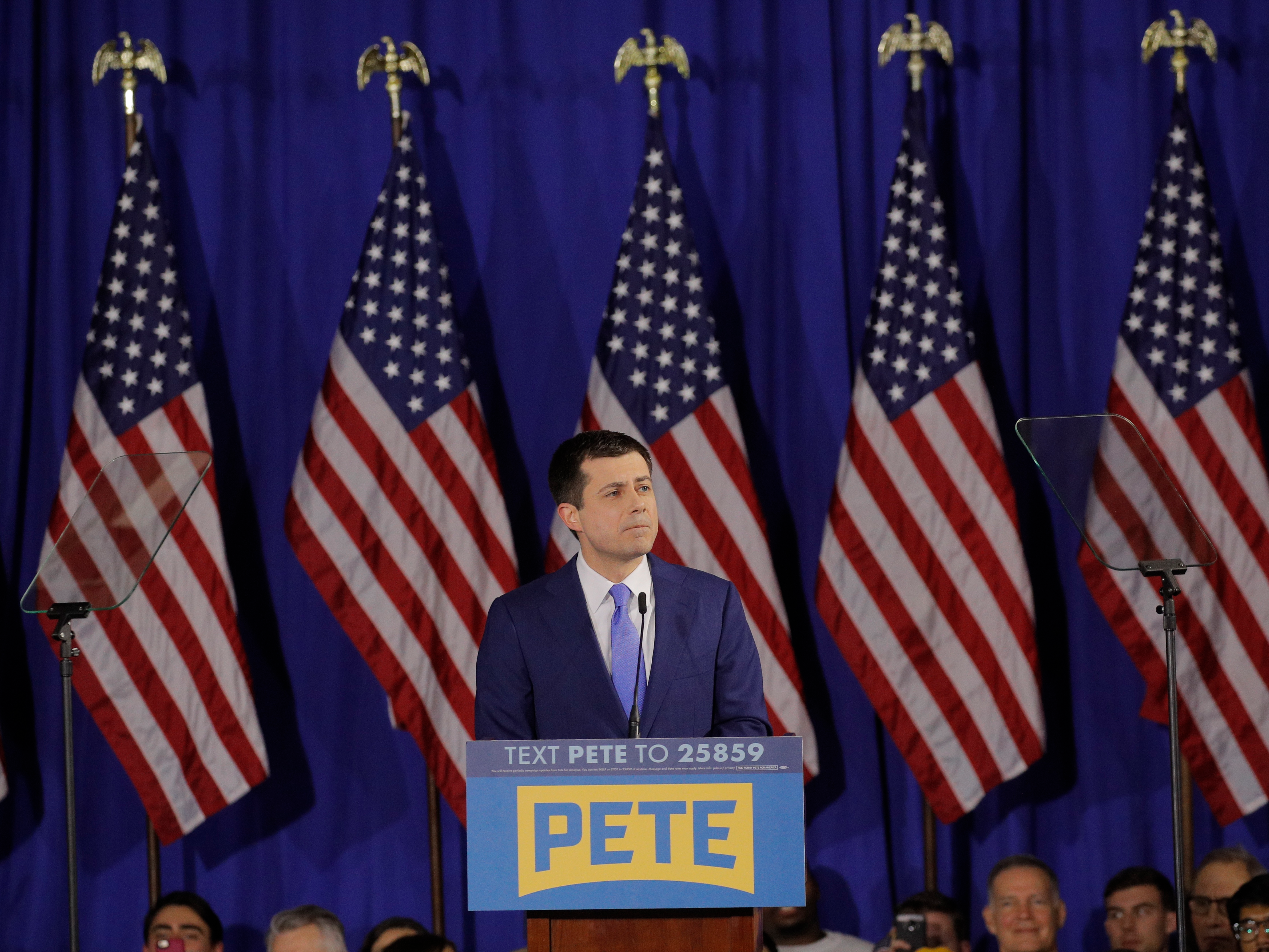- Former South Bend, Indiana, mayor Pete Buttigieg finished a close second to Senator Bernie Sanders in the New Hampshire presidential primary.
- Buttigieg has faced sharp criticism from progressives led by Bernie Sanders for accepting campaign donations from 40 billionaires but says their money is just another tool to help him defeat Donald Trump.
- #PetesBillionaires trended on Twitter Friday after Sanders read aloud (and tweeted) a list of headlines calling Pete Buttigieg a “big business candidate” that “has most exclusive billionaire donors of any Democrat.”
- Buttigieg has tried to ally himself with the middle class by repeatedly saying that he’s the only Democratic candidate who is not a millionaire or billionaire, a fact that is undermined by his wealthy upbringing, elite education, and history of earning six-figure salaries.
- Visit Business Insider’s homepage for more stories.
The American 1% may love Pete Buttigieg, but the feelings might not be as mutual as Bernie Sanders would have voters believe.
Buttigieg has faced sharp criticism from progressives, led by Sen. Bernie Sanders, for accepting campaign donations from 40 billionaires, but Buttigieg doesn’t seem to be any more enthusiastic about it than his detractors are. Sanders has refused on principle to accept donations from anyone in the three-comma club, even returning a $470 donation he received from a billionaire’s spouse.
Buttigieg claims, however, that any of his billionaire donors and their funds are no more than a needed resource to gain traction in a crowded primary field, and eventually, against President Trump.
Just as the role of wealth in American society has become a flashpoint in the election, Buttigieg’s relationship to the wealthy has fast become fraught – and is more complex than you might have heard.
The short (and complicated) history of Mayor Pete as the billionaire candidate
The attacks against Buttigieg come as anti-billionaire sentiment rises across the country and the progressive and moderate wings of the Democrats become increasingly pitted against each other. The left-wing Sanders and Sen. Elizabeth Warren have both been outspoken in their criticism of America's wealthiest people and Buttigieg's apparent solicitousness of them. Warren sells "billionaire tears" mugs and hosts a wealth tax calculator on her campaign website, which also takes thinly-veiled swipes at Bill Gates and Leon Cooperman. And her tough rhetoric has instilled fear in many billionaires, former Goldman Sachs partner and hedge-fund manager Michael Novogratz told Bloomberg.
Though Sanders has long spoken out against the ultra-wealthy, his most recent attack on Buttigieg came just four days after the two Democrats finished neck and neck in the Iowa Caucus. Sanders shortly soon after won the New Hampshire primary, with Buttigieg finishing a close second.
During an appearance on The Late Show with Stephen Colbert on February 6, Buttigieg defended his decision to accept financial support from billionaires, saying that his small-city Midwestern roots don't make him "an establishment fundraising powerhouse." Buttigieg went on to say that he thinks anyone who supports his platform should be able to donate to the campaign - billionaires included.
Buttigieg had previously expressed frustration with the campaign finance regulations that currently give the wealthy outsized influence in the electoral process. He doesn't take donations from corporate political action committees and has pledged not to take money from the fossil fuel industry, Business Insider reported. The majority of Buttigieg's campaign funding comes from small donors, the Washington Post reported, including $2.7 million from 22,000 new donors after the Iowa Caucuses.
Buttigieg received campaign donations from 40 billionaires and their spouses, including the wife of former Google CEO Eric Schmidt, Netflix CEO Reed Hastings, and hedge fund manager Bill Ackman, a Forbes analysis of campaign documents published in December found.

That likely still leaves Buttigieg's war chest slimmer than Sanders', who also emerged as a frontrunner in Iowa and New Hampshire. It took Buttigieg until December 2019 to reach five million total donations, a total that Sanders had hit in July, according to The New York Times. Even with several donations to Buttigieg from billionaires hitting the $2,800 federal donation limit, the former mayor's campaign is showing "signs of financial strain," The Times reported.
Buttigieg took a break from the campaign trail to focus on fundraising in early February, according to The Times, while Sanders disclosed on February 6 that his campaign had raised $25 million in January alone, The Times reported.
A representative for Buttigieg's campaign did not immediately respond to Business Insider's request for comment on Buttigieg's decision to accept donations from billionaires.
The former mayor came under fire in December after attending a fundraiser in a wine cave which cost guests $2,800 apiece to dine under a chandelier covered in 1,500 Swarovski crystals. #PetesBillionaires trended on Twitter Friday after Sanders read aloud (and tweeted) a list of headlines calling Pete Buttigieg a "big business candidate" that "has most exclusive billionaire donors of any Democrat."
Both California Senator Kamala Harris and former Vice President Joe Biden have had more billionaire backers than Buttigieg, however. Biden accepted donations from 44 billionaires, Forbes reported. Harris had the financial support of 46 before dropping out of the race in December.
Buttigieg insists that he's not a one-percenter.
Buttigieg has repeatedly said that he's the only Democratic candidate who is not a millionaire or billionaire, according to Forbes. Buttigieg and his husband Chasten have a combined net worth of about $100,000, Forbes estimates, as their tax returns show that $180,000 in student loans and two mortgages weigh against most of their wealth. The magazine estimates that Sanders is worth approximately $2.5 million, while Senator Elizabeth Warren is worth about $12 million. The Buttigiegs' income is still substantially lower than that of Sanders, who each earned more than $1 million in 2018, Forbes reported.
The 38-year-old former mayor's net worth may have more to do with his age than his socioeconomic status, Elena Botella argues in a Forbes contributor piece. The six-figure salary Buttigieg earned during his eight years as South Bend's mayor (with the exception of while he was deployed to Iraq in 2014) put him on track to become a millionaire by age 60 as his retirement savings grow.
Buttigieg's elite credentials don't do much to help him convince progressives that he's not pro-billionaire.
Buttigieg's wealthy upbringing makes him 42% less likable in the eyes of primary voters, INSIDER polls found. Buttigieg graduated from Harvard before being selected as a Rhodes scholar, and previously worked as a consultant for McKinsey & Company, the vaunted and controversial consultancy.
Sanders, however, often uses his humble upbringing as the son of a paint salesman to pitch his views on inequality and his aggressive wealth tax proposal, according to Forbes. Buttigieg says he too supports raising taxes on wealthy Americans but has yet to release a formal proposal, but will use their wealth to fund his campaign, Business Insider reported.
"I will make exactly one promise to anybody," Buttigieg said when questioned about his billionaire donors by Stephen Colbert, "whether they're giving three bucks online or the maximum allowable by law, and the promise is I'm going to take that contribution and I'm going to use it to build the campaign that's going to defeat Donald Trump so that we can actually get the reforms that this country needs."

